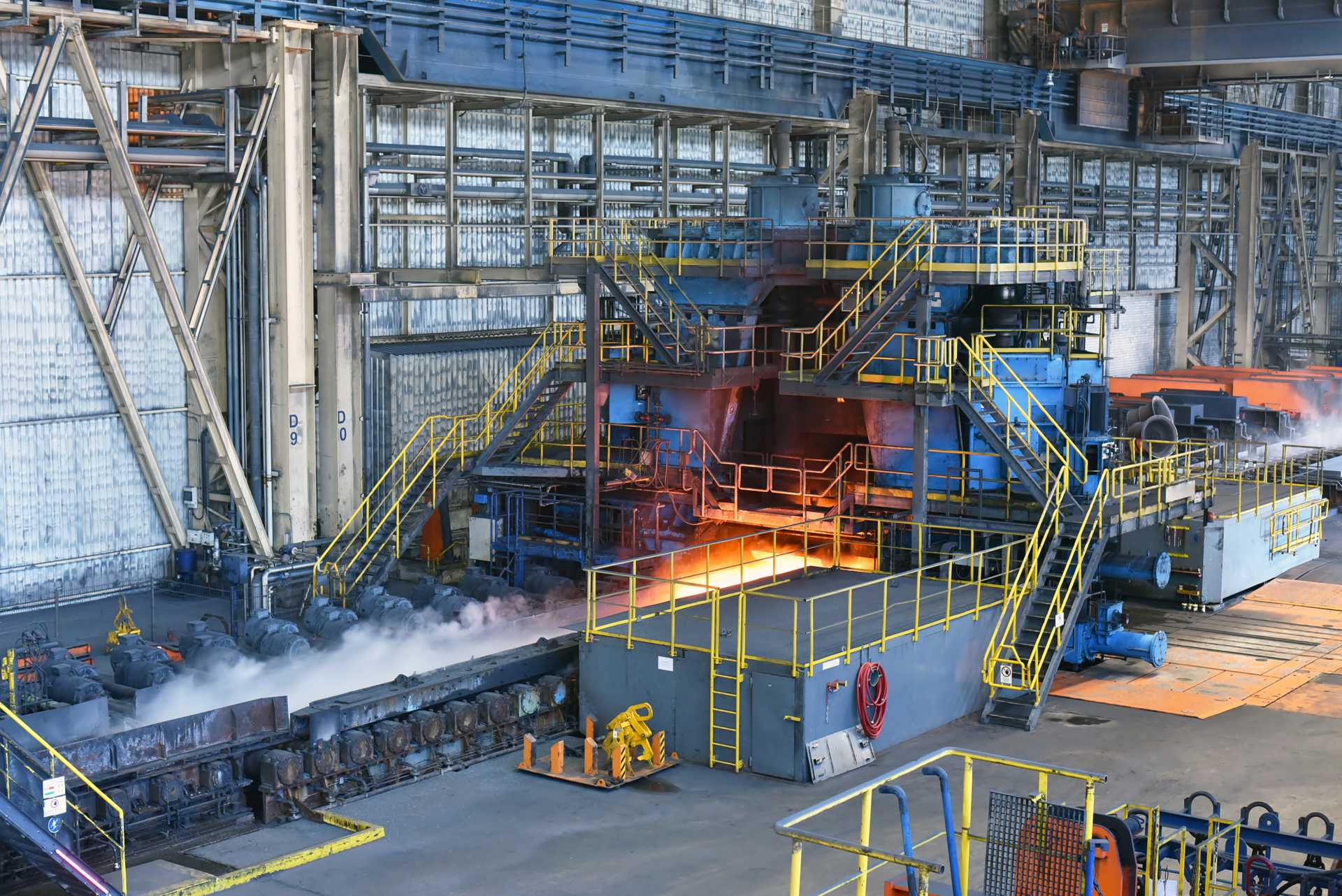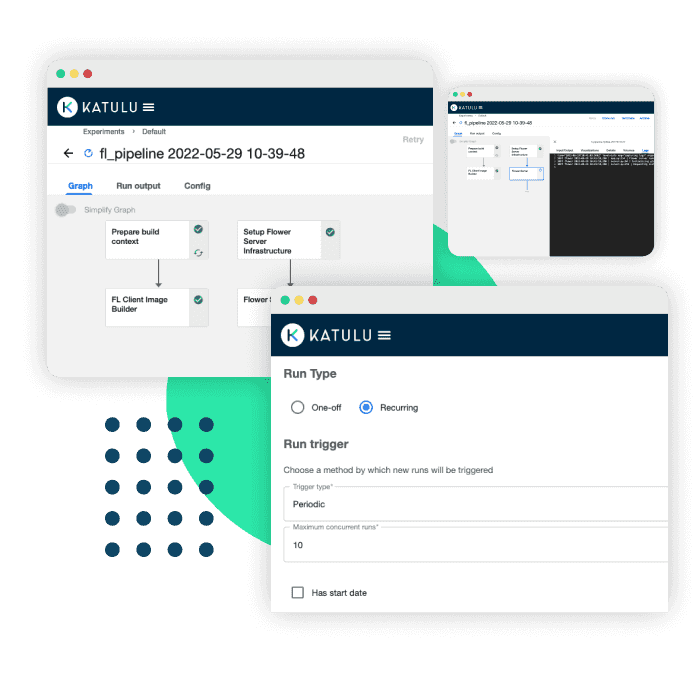
Process Digital Twin for Thermal Process Equipment for Cost-Effective Design and Manufacturing
Simulation of customer-specific thermal processes for special machines using digital process twins based on the Katulu Platform
Initial situation
Highly customized systems and sensitive production dataA manufacturer of thermal processing equipment wants to enable its customers to operate existing equipment cost-efficiently through process simulation. All plants consist of customized system solutions in which different assemblies are installed. This makes it difficult to implement customer-specific digital twins using conventional machine learning technology. The overall system solutions are not directly comparable with each other, which makes it difficult to collect a sufficiently large database. In addition, sensitive production data of the operators must not leave the production facilities for IP and legal reasons.
No data available
The data for an AI solution is not accessible!The data basis is crucial for the use of AI. Since special machines are customized system solutions, comparability is a challenge. It is also difficult to look at the level of assemblies, since it is hardly possible for an individual company to collect sufficient data for comparable assemblies on its own. Collecting this data directly in the field from the operators usually fails because of the fundamental problem with using AI in industry. Companies don't want to share their data. This is also true for industrial operators whose unique selling point is to execute a thermal process perfectly. After all, companies want to protect their process knowledge and safeguard their competitiveness. But without this data it is not possible to train an AI model for process simulation.
Solution
Train AI models locally without sharing source dataWith our AI technology, operator-specific digital twins are created for the purpose of simulating thermal processes - without sensitive raw data ever leaving a plant. With digital process twins, the simulation of manufacturing processes for each customer is possible on the screen - without incurring costs in production. With our platform, digital twins can also be used in special machine construction, since Katulu trains models at assembly level and relates them to one another. With the help of clustered federated learning technology, these models can be trained individually for each customer. The operators are provided with the image of their own systems and only exactly the melting process knowledge that is relevant for their own applications. In this way, the optimal processing parameters for AHSS grades are identified from the melting process knowledge of all plants - without sensitive data becoming visible. As early as the production planning stage, informed decisions are made that proactively identify and optimize inefficiencies or even faulty processes, thereby saving costs. There is also the option of linking the digital twin with the customer's own systems in order to also take into account individual aspects such as operating costs and raw material availability in the simulation.

Does this scenario sound familiar?
Let us talk about your use case. We look forward to hearing from you.
Book AppointmentThe initial AI model
Developing a decentralized model starts with data collection. First of all, the first data sets of the thermoprocessing systems are recorded in the technical center or laboratory in order to train a first model. Here, Katulu initially concentrates on the data that can be accessed directly from the controller. The labeling of the data, i.e. the marking of the data records according to error cases and quality grades, is decisive for data acquisition. For this purpose, experiments are carried out with different machine parameters and cycle times and the test results are evaluated in order to relate features to the control data. A valuable data source is also historical data that can be assigned to a specific error case.
With this data, a first AI model is trained to identify the key influencing factors, with the aim of enabling simulations of the process.

The functional minimum viable product (MVP)
The first model is being rolled out along with edge hardware to help pilot customers optimize a production process. Here, it is crucial to capture the operator's feedback on the results of every process in order to label the data. In this phase, a tablet is used to capture feedback, as direct intervention in the thermoprocessing equipment needs to be avoided. This data is correlated with data from the respective PLC. Then, more robust and versatile models are trained using federated learning to capture further combinations of operators, thermoprocessing equipment and melting processes. As usual with Katulu's approach, all raw data remains in the production facility.
Refinement with Clustered Federated Learning
The model is trained on all connected thermal process equipment using federated learning. Katulu's federated clustering algorithm automatically groups comparable combinations of assemblies across company boundaries - without sharing sensitive data between collaborating parties. The resulting models are matched to the different custom machines, configurations, materials, process data, etc. of the various users. This guarantees the best possible simulation and optimization of the melting process across all applications.
Continuous improvement
Continuous training and deployment cycles improve the model. Special model metrics (federated analytics) ensure that these improvements also represent an improvement of the local AI model at the respective thermal processing plant. When this level of maturity is reached, the right time has come to train more advanced models that are suitable for simulating the entire special plant.

Self-optimizing thermoprocessing plant
Every model will be extensively tested in the field. Only after its high robustness and accuracy has been proven in numerous iterations and validations, the machinery will intervene directly in the melting process, for example to achieve the optimum melting point with minimal energy input. The edge hardware enables the machine to control the process in real-time and further fine-tune it based on customer applications and preferences.

Are you ready for your journey into distributed machine learning?
We are looking forward to supporting you with your ideas and projects.
Termin vereinbarenAdvantages of the Katulu Platform
The challenges for engineering in metallurgy are becoming increasingly complex, exemplified by closed-loop manufacturing and the rapidly increasing demands for resource efficiency due to the global shortage of raw materials. The benefits of our platform in metallurgy are manifold and an important step towards meeting the new challenges.
Higher machine availability
Do you provide world-class metallurgical equipment that rarely fails? Katulu helps you capture the rare failures of system-critical assemblies to avoid machine breakdowns at an early stage in terms of predictive maintenance and to sustainably extend the product life cycle.
Optimal Energy and Resource Efficiency
Katulu creates the conditions for determining the ideal end time of the melting process using multiple metallurgical plants in the field for optimal energy and resource efficiency.
Enabling AI for special purpose machines
Custom machines are unique - so is their data, which is why Katulu focuses on training models for standardized assemblies. By combining these models, meaningful models can be mapped for the individual machine as a whole.
Our platform identifies which machines and assemblies can be trained together according to their design and automatically groups them into clusters that can be trained together. Changes to the design of a machine are automatically detected and result in an adjustment of the grouping. This ensures that each machine - no matter how individual - learns from other comparable machines or assemblies.
Better simulations
Through ongoing machine learning, with each iteration, the pooled insights continuously flow back into the customers' individual models, thereby improving them. This iterative process increases the accuracy and robustness of models and also avoids bias effects such as bias or bias despite customer-specific optimization. As a result, Katulu Federated Learning creates more reliable models for better simulations of rare events such as machine failures.
Harnessing knowledge
From employee turnover to demographic change, Katulu makes it easy for you and your users to capture and leverage empirical process knowledge across organizational boundaries. Because your industrial users learn from each other without learning about each other, your users are protected.
True Data Sovereignty
Katulu protects everyone's data sovereignty. Machine builders, plant operators and industrial users benefit from mutual anonymized insight without sharing sensitive data.

Ready to bring AI on the shopfloor?
Book a free consultation with our experts to talk about your AI project.
Book meeting


